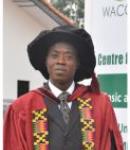
I have no doubt that the training I will receive at WACCI and those I have received previously from reputable International institutions such as CIAT CIMMYT and IITA will definitely enable me to make the desired impact to the benefit of the African farmer God willing. It was a great feeling for Allen when he received the news that he had been admitted to the West Africa Centre for Crop Improvement (WACCI) University of Ghana for a 5-year study leading to the award of a PhD degree in Plant Breeding. For Allen being admitted into this programme was a great opportunity to contribute his quota to the process of reducing hunger in Ghana and subsequently the rest of Africa. I have always had an inquisitive mind. I remember one day in primary school I had a conversation with my senior brothers. I asked them why foods like rice maize etc. increase in volume when cooked. They gave me several reasons but I was not satisfied with their answers. So I told them I will conduct my own test to find out why this happen. I told them that I was going to do this by counting 10 grains of rice and then cook them to see if the rice grains will increase in number. But this did not go down well with them because they thought I should just accept the simple fact that rice volume increases when cooked. Worst of all they cautioned me that I could die if I continued to seek for explanations for natural processes Allen believes he is not the only one who has encountered the above situations in the African setting. Fear arising often times from unexplained religious traditional or cultural beliefs has been the bane of the ordinary African farmer. Farming in Ghana and for that matter sub-Saharan Africa needs a lot of scientific innovations if we are to make any impact in our quest for sustainable food production and self reliance. In view of this Allen has decided to dedicate his research work at WACCI and beyond to developing crop cultivars particularly maize that can break traditional barriers for wider acceptance and cultivation by the majority of farmers.Ê Research has shown that African farmers do not necessarily hold on to old low yielding traditional varieties but they are amenable to change when they see visible alternatives that are more productive than their own indigenous types. With his background in crop protection practical experience over the years both as a Research Assistant and Research Scientist at the Centre for Scientific and Industrial Research (CSIR) Crops Research Institute (CRI) coupled with his association with leading researchers in crop improvement home and abroad Allen is poised to develop varieties that are not only disease resistant but are high yielding with adequate quality attributes that local farmers and consumers will find completely acceptable.
